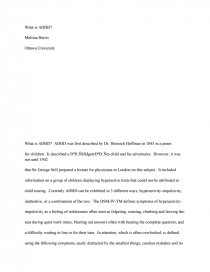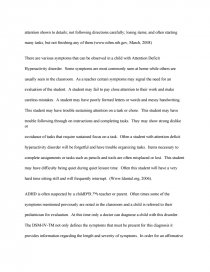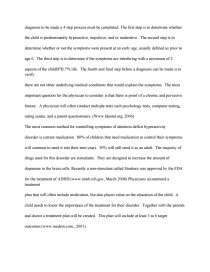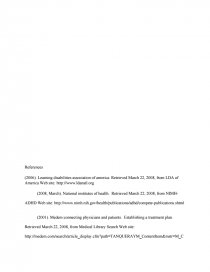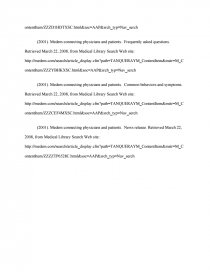What Is Adhd?
Essay by review • February 12, 2011 • Research Paper • 845 Words (4 Pages) • 1,175 Views
What is ADHD?
Melissa Harris
Ottawa University
What is ADHD? ADHD was first described by Dr. Heinrich Hoffman in 1845 in a poem
for children. It described a “fidgety” child and his adventures. However, it was not until 1902
that Sir George Still prepared a lecture for physicians in London on this subject. It included
information on a group of children displaying hyperactive traits that could not be attributed to
child rearing. Currently ADHD can be exhibited in 3 different ways, hyperactivity-impulsivity,
inattentive, or a combination of the two. The DSM-IV-TM defines symptoms of hyperactivity-
impulsivity as a feeling of restlessness often seen as fidgeting, running, climbing and leaving the;
seat during quiet work times; blurting out answers often with hearing the complete question; and
a difficulty waiting in line or for their turn. In attention, which is often overlooked, is defined
using the following symptoms, easily distracted by the smallest things; careless mistakes and no
attention shown to details; not following directions carefully; losing items; and often starting
many tasks, but not finishing any of them.(www.nihm.nih.gov, March, 2008)
There are various symptoms that can be observed in a child with Attention Deficit
Hyperactivity disorder. Some symptoms are most commonly seen at home while others are
usually seen in the classroom. As a teacher certain symptoms may signal the need for an
evaluation of the student. A student may fail to pay close attention to their work and make
careless mistakes. A student may have poorly formed letters or words and messy handwriting.
This student may have trouble sustaining attention on a task or chore. This student may have
trouble following through on instructions and completing tasks. They may show strong dislike or
avoidance of tasks that require sustained focus on a task. Often a student with attention deficit
hyperactivity disorder will be forgetful and have trouble organizing tasks. Items necessary to
complete assignments or tasks such as pencils and tools are often misplaced or lost. This student
may have difficulty being quiet during quiet leisure time. Often this student will have a very
hard time sitting still and will frequently interrupt. (Www.ldantal.org, 2006).
ADHD is often suspected by a child’s teacher or parent. Often times some of the
symptoms mentioned previously are noted in the classroom and a child is referred to their
pediatrician for evaluation. At this time only a doctor can diagnose a child with this disorder.
The DSM-IV-TM not only defines the symptoms that must be present for this diagnosis it
provides information regarding the length and severity of symptoms. In order for an affirmative
diagnosis to be made a 4 step process must be completed. The first step is to determine whether
the child is predominantly hyperactive, impulsive, and or inattentive. The second step is to
determine whether or not the symptoms were present at an early age, usually defined as prior to
age 6. The third step is to determine if the symptoms are interfering with a minimum of 2
aspects of the child’s life. The fourth and final step before a diagnosis can be made is to verify
there are not other underlying medical conditions that would explain the symptoms. The most
important question for the physician to consider is that there is proof
...
...
